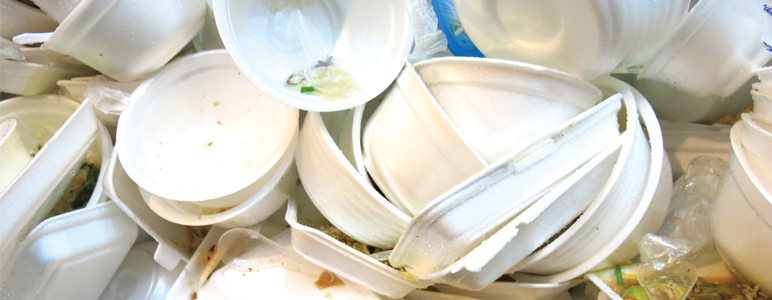


We’ve all seen it, whether out surfing, taking a walk on the beach or strolling by a storm drain after it rains – litter composed of food service containers made of polystyrene, more commonly but incorrectly known as Styrofoam™. In order to address the problems of polystyrene single-use food containers, Equinox Project, an initiative of Center for Sustainable Energy (CSE), produced an in-depth analysis of the economic and environmental impacts of municipal policies regarding such food service products.
According to the report, the vast majority of polystyrene food containers are used once and discarded, ending up as landfill trash or as litter. The good news is that the report finds that for restaurants to switch from nonbiodegradable plastic foam food and beverage containers to more environmentally friendly products should not create a substantial financial burden for the businesses or their customers, with products only costing a few more cents per item to package.
Read the Report: Recommendations for Reducing or Banning Foam Food Service Containers
The new report is timely with over 99 cities and counties throughout California already adopting some sort of polystyrene ordinance, with the city of Encinitas being one of the latest to enact a ban. However, opposition to these bans has been constant, with people often citing the economic impacts on the restaurant industry, which already has a low profit margin. On the other hand, supporters cite environmental impacts on marine and terrestrial ecosystems, specifically polystyrene’s propensity to break into smaller pieces that are easily ingested by wildlife, and the negative economic impact of litter on tourism.
Equinox Project works at the intersection of these two issues, believing that the economy does not need to be sacrificed for the environment and vice versa. According to our research, while replacing polystyrene containers might create slightly higher costs for consumers, these costs are negligible, and some customers prefer supporting restaurants that use recyclable takeout containers. In addition, businesses may be able to overcome cost increases with organized bulk purchasing or through financial hardship waivers, where available, when profit margins are too low.
Roadmap for creating policies
Equinox Project has created a roadmap to help jurisdictions make policies that take into consideration both the economy and the environment. The roadmap makes nine recommendations for jurisdictions considering polystyrene food container bans or reduction ordinances, ranging from evaluating whether specific alternatives will be required to conducting pre- and post-ordinance litter audits.
For areas not considering ordinances, the report recommends efforts to limit environmental impacts of polystyrene food ware by supporting and incentivizing voluntary reduction programs, informing restaurants about alternative materials and educating consumers on the long-term effects of polystyrene in the environment to encourage behavioral changes to not litter.
Ordinances enacted nationwide
In addition to the 99 California cities and counties, the District of Columbia and cities in nine other states have enacted polystyrene reduction policies, including, Florida, Maine, Maryland, Massachusetts, New Jersey, New York, Oregon, Texas and Washington. Currently in the San Diego region, the cities of Solana Beach and Encinitas have passed polystyrene bans and the city of San Diego is exploring the possibility of a citywide ban.
Research for the paper was supported by a grant from Patagonia Cardiff. CSE is an independent, nonprofit organization headquartered in San Diego that provides program design and management, policy guidance, education and research related to clean energy market development and transformation.

